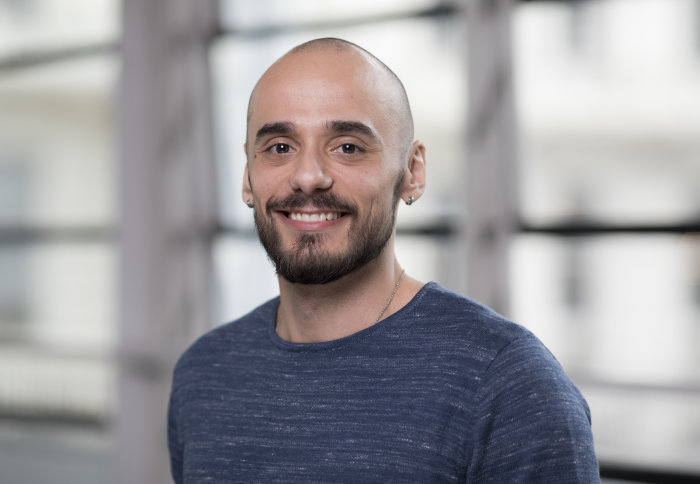Software for 3D printing could create better machine components
by Kerry Noble

Dr Marco Pietropaoli, TOffeeAM co-founder
A startup co-founded by Imperial researchers is developing software to design complex mechanical components.
Co-founder Dr Marco Pietropaoli in the Department of Aeronautics last year participated in Techcelerate, an Imperial programme that helps early-career researchers develop technology ventures based on their research. The startup, TOffeeAM, has now secured business from customers including energy giant General Electric.
“Our software uses state-of-the-art maths models combined with artificial intelligence to design and improve components such as those used in aircraft and car engines,” Dr Pietropaoli explains.
"Twenty years ago, our technology would have been useless but it’s really important right now. The introduction of 3D printing in the aeronautical and automotive industries means we’re able to build really intricate components. Our software is able to find those complex and optimised designs.
“We can create more efficient, more resilient and more robust components. They might be lighter, or they might help reduce fuel consumption. The advantage of designing components in this way is what we call ‘robust optimisation’, which means they can cope with errors in design data or in manufacture.”
The idea for the software came from Dr Pietropaoli’s PhD supervisor, Dr Francesco Montomoli, Reader in Computational Aerodynamics at Imperial. Working with Dr Audrey Gaymann, then a PhD student in the Department of Aeronautics, they developed the design software for around three years before Dr Pietropaoli began Techcelerate.
Customer discovery with Techcelerate
Dr Pietropaoli says: “Techcelerate was the best programme I experienced at Imperial because it doesn’t try to do too much. For three months you can focus just on customer discovery.
“In my case, I began with one hypothesis, which was that our product would be useful for the aeronautical industry and I tested that hypothesis by talking to companies in several different sectors.
“I spoke to people in the automotive, energy and appliance industries, as well as the aeronautical industry. I realised that all these different industries have pretty much the same needs and the same problems. All of them want our software to improve their components but they all go at different speeds.
“In our case, the automotive, aeronautical and energy industries are ready for this technology and so they are all good markets for our software.”
From lab to startup
Since completing the Techcelerate programme in 2018, Dr Pietropaoli has combined his academic work – graduating from his PhD and developing the technology in the lab – with progressing the startup business, TOffeeAM Ltd. He has benefitted from the Imperial Venture Mentoring Service, run by the Enterprise team, which provided two mentors for regular meetings and ongoing advice.
TOffeeAM is run by Dr Pietropaoli, Dr Montomoli and Dr Gaymann, and was incorporated in March 2019. Dr Montomoli recently won a prestigious Royal Academy of Engineering Enterprise Fellowship with £60 thousand in funding for TOffeeAM.
The team have already secured business from General Electric and its sister company Baker Hughes, as well as a Formula One racing team.
Dr Pietropaoli continues: “We spent time on creating the legal bones of the company. Then we applied for Entrepreneur First. They are a business incubator who generally hire people with business ideas and invest in those ideas and build teams.
“In our case it was a bit different. They were really interested in our venture, so we skipped the first phase – building teams – and we entered right to the second phase – the launch. They gave us £80 thousand, two months of business coaching and all we needed to prepare for our launch date.
“This is a really important time for us where we are trying to raise the seed-funding we need to scale up the company. For now, we are just three people and we are doing everything, which is a big constraint.”
Investor interest
The TOffeeAM team have recently demonstrated their software at the Entrepreneur First launch. Along with 26 other startups, they were given a three-minute slot to pitch to around 500 potential investors.
This was followed by two hours of networking: “We had a stand and investors were coming and asking questions, exchanging business cards and booking meetings for the following days.”
Dr Pietropaoli concludes: “I am really confident. After the launch day, investors are showing lots of interest. These are people who have recently invested in technology related to industrial 3D printing. For them, we are the next step because we have the software to improve the technology that they’re already invested in.”
Enterpreneurial ecosystem
The Enterprise team at Imperial offers a variety of services and programmes to support entrepreneurial academics, early-career researchers and students and help businesses from outside the Imperial community to access the College's talent and expertise. More information is available from the Enterprise website and the Review of Enterprising Activity.
Article text (excluding photos or graphics) © Imperial College London.
Photos and graphics subject to third party copyright used with permission or © Imperial College London.
Reporter
Kerry Noble
Department of Surgery & Cancer